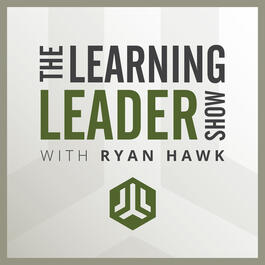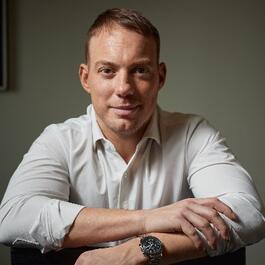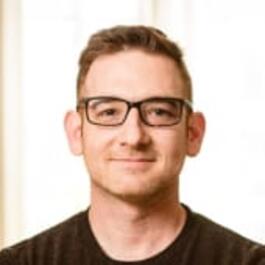
315: Gabriel Weinberg - Using Mental Models To Make Better Decisions
The Learning Leader Show With Ryan Hawk #315: Gabriel Weinberg - Using Mental Models To Make Better Decisions Full show notes can be found at www.LearningLeader.com Gabriel Weinberg is the CEO & Founder of DuckDuckGo, the Internet privacy company that empowers you to seamlessly take control of your personal information online, without any tradeoffs.He co-authored Traction: How Any Startup Can Achieve Explosive Customer Growth and co-wrote, Super Thinking. Gabriel holds a B.S. with honors from MIT in Physics and an M.S. from the MIT Technology and Policy Program. He has been profiled in The Washington Post and Fast Company, and is routinely quoted in leading print publications such as The New York Times and the Wall Street Journal. Weinberg is also a frequent TV commentator, appearing on CNN, CNBC, and CBS This Morning, among others. Notes: Commonalities of leaders who have sustained excellence: A desire and openness to grow as a person People want to follow them -- They set up systems for others to succeed They make sure the team is headed in the right direction The North Star -- Must always orient yourself towards whatever that is for you Your personal mission statement Maximize impact on the world -- Where do you want to go? Define what that is for you DuckDuckGo is an internet privacy company -- Started in 2008 for private search (a competitor to Google). Gabriel discussed how he was ahead of his time -- The secret is something you know about the world that others don't yet. Search is the most personal thing on the internet. Gabriel wanted to create an alternate (private) to Google. Mental Model -- A concept for general decision making. A few hundred concepts that are useful for better decision making Become a 'chef' with your thinking -- 1st principles thinking. Your intuition can be wrong. Best practices can also be wrong. You need to focus on being wrong less. 1st Principles = Most intentional way of thinking: Question assumptions. Every project has a scoping template: What is the objective of the project? What is success criteria? What are you trying to solve? Does everyone agree? Discussion with team -- Operationalize 1st principles Why the pro/con list is not as helpful as the cost/benefit list: Write down cost over time -- Rate everything vs that Example: Where should we go on vacation? Rate on a scale 1-10. Combine cost and benefits. Do a post mortem after every project -- It forces critical thinking and analysis What went well? What didn't? Given those things, how can we operationalize to do better? Why is it rare to do a "success autopsy?" By default, an after action review will not happen. It must be built into the process. Our default setting is to move on to the next project. What was it like writing a book with his wife? Lauren McCann is Gabriel's wife and co-author on Super Thinking "We would walk together every morning and talk about the book." It became the primary topic of conversation for a long time Charlie Munger multi-disciplinary approach: At DuckDuckGo, this is their goal --> Grow people internally. They work hard to help their team make better decisions Structure of DuckDuckGo: 70 team members -- fully distributed all over the world Immense delegation happens daily What does Gabriel look when hiring someone to the team? Self starters -- The team is fully distributed. They have a lot of autonomy and ownership. People are empowered and must be willing to work without a boss watching them. Question assumptions Great communicator -- There is a lot of written communication when the team is all over the world. Must be able to write well. Experimental mindset Validate direction -- Run experiments if you have a hunch and then analyze your findings Build trust -- Very key. There is heavy transparency at DuckDuckGo. Must be trustworthy. How to find candidates who possess these qualities? Do paid projects as part of the hiring process... Get a feel for them actually doing the job before you hire them full time. Culture: "We have a 'thank you' culture" "Most respectful interpretation" of every interaction. Give people the benefit of the doubt. Thoughtful and intentional Gabriel's upbringing: His dad was a doctor. His mom was an artist. How to flex your market power? Combine two particular sets of skills, go deep learning them (eg. be a great finance person and public speaker. Look for gaps in the market or within your company, and use your unique skills (like Liam Neeson in Taken) and attack the problem. Most people just do what they're told. Don't settle for that. Why shouldn't we trust our gut? Availability bias - May not remember all the options Confirmation bias - the tendency to interpret new evidence as confirmation of one's existing beliefs or theories. Use it as a hypothesis generator, then question it. Don't fully commit until the necessary work is done. "Thinking gray." --> Delay decisions until they absolutely must be made. Jeff Bezos opens a door, but may come back through it. "We'll do this now, but we may walk it back." How to build trust? Vulnerability speeds up the process of building a trusting environment. "Relationships move at the speed of vulnerability." Anders Ericsson -- Deliberate practice. Work at the edge of your comfort zone. Receive coaching in real time. Hire an executive coach Create a board of advisors Day to day -- check your thinking and explain it (write, give speeches) Writing is the best form of thinking critically --> "It's the best way to clarify my thinking" Overall life advice: What is your north star? What areas do you want to pursue? What are you current skills? Find your highest leverage point, study those areas More Resources: Read: Super Thinking Follow Gabriel on Twitter: @yegg Be part of "Mindful Monday" -- Text LEARNERS to 44222 Connect with me on LinkedIn Join our Facebook Group: The Learning Leader Community To Follow Me on Twitter: @RyanHawk12
From "The Learning Leader Show With Ryan Hawk"




Comments
Add comment Feedback